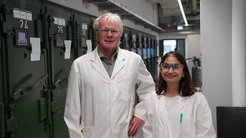When special mills go to market
Postdoc of the Max Planck Institut für Kohlenforschung applies for funding for her own startup “MechSyn”.
Dr. Özgül Agbaba wants to set up her own company. She has now applied for funding for her company "MechSyn".

Work scientifically? Yes, please - but with a clear link to application. Work in a company? Gladly - but please in your own! Dr. Özgül Agbaba, a postdoc in Prof. Ferdi Schüth's Department of Heterogeneous Catalysis at the Max Planck Institut für Kohlenforschung, has a plan. The young scientist from Turkey is getting her own start-up off the ground. MechSyn is the name of her company - a result after a long brainstorming process within the research group. A novel method for synthesizing high-performance materials is what MechSyn wants to offer its customers. Mechanochemistry plays a major role in this - a scientific principle that is fascinating the Schüth group.
"Mechanochemistry allows us to synthesize materials that are almost impossible to produce any other way," explains Özgül Agbaba. This means, for example, that solid starting materials are filled into a ball mill which then begins to rotate or shake. Other reagents can be added to the container in gaseous form. Then, with the help of the eponymous balls - made of metal or ceramic - something special happens: "Reactions for which we normally need high temperatures and/or extremely high pressure take place at room temperature and normal pressure," explains Agbaba. This approach speeds up reactions, and can be more sustainable compared to more traditional methods. This is scientifically exciting and, of course, interesting for industry for economic reasons, emphasizes Özgül Agbaba. After all, lower temperatures mean lower costs and no uses of fossil fuels.
From lab scale to industry scale
And that's where MechSyn's idea comes in: "We have good experience with mechanochemical synthesis on a laboratory scale," says Özgül Agbaba. Now, she says, it's a matter of scaling up the experiments. In a first step, the chemist wants to produce the desired products on a few 100-gram scale and send them to potential customers so they can test them out. The next step would be to construct larger ball mills to produce the desired chemicals by the kilo. Özgül Agbaba, who had experience working for an industrial company before becoming a postdoctoral researcher, knows, "It will be costly, but we have a clear plan. And we are convinced that we can succeed with our idea."
The researcher has the backing of Prof. Ferdi Schüth, executive director at the Max Planck Institut für Kohlenforschung. He was one of the founders of the Heidelberg-based company hte in the 1990s. He says, "There are many scientists who have great ideas but lack the feel for marketing - or who have difficulty locating potential customers." In this regard, he says it is essential that scientists also make an effort to apply their findings, if possible. "Startups like Özgül's are one possible way to bridge the gap from research to business."
Currently, Özgül Agbaba is applying for funding with her project MechSyn at EXIST-Forschungstransfer, which supports research-oriented projects. It is a program of the Ministry of Economic Affairs, Industry, Climate Protection and Energy. "The funding from EXIST-Forschungstranfer is exactly for purposes similar to ours, transferring our great research results into applicable scales for industry, and it would be a great help in getting our company off the ground," says Özgül Agbaba. But either way, the young woman is convinced of the idea behind MechSyn.
The start-up has been featured by CheManager Magazine.












